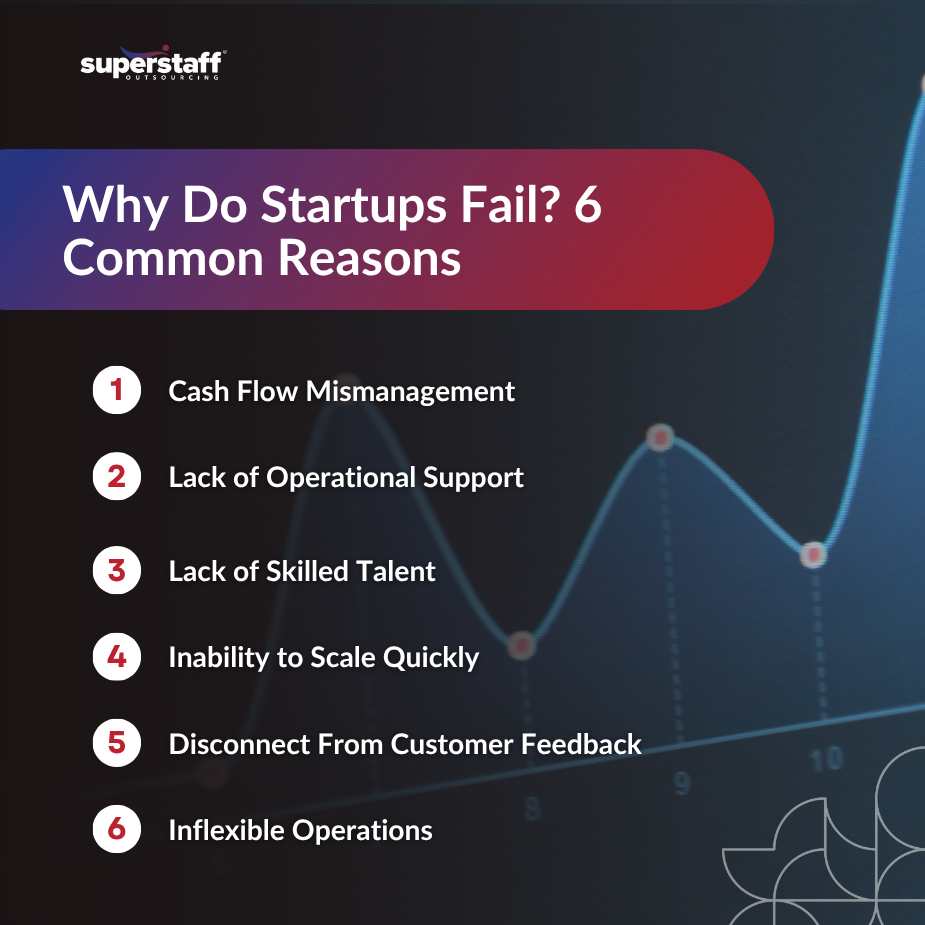
Every year, thousands of startups close their doors before they even reach their third anniversary. It’s a tough reality that many founders face—and one that often raises a sobering question: Why do startups fail even when they have a solid idea and initial momentum?
The answers are surprisingly consistent across industries. Most early-stage businesses fall short due to poor cash flow management, difficulty hiring the right talent, and inefficient operations. Many founders take on too much, too soon, without the infrastructure or support to sustain growth. Others burn through capital by building large in-house teams before truly validating their product or market.
While not every challenge can be prevented, many of the risks that derail new ventures can be mitigated through outsourcing. By leveraging external expertise for non-core functions like customer support, finance, and admin, startups can stay lean, agile, and focused on growth.
In this blog, we’ll break down the top reasons why startups fail—and how outsourcing can help you avoid becoming part of that statistic.
1. Cash Flow Mismanagement Is One of the Top Reasons Startups Fold
One of the most common failure reasons for startups is poor cash flow management. Even profitable businesses can go under if their cash is tied up in unpaid invoices, unexpected expenses, or bloated payrolls.
Startups often make the mistake of hiring full-time employees too early, committing to fixed salaries before fully validating demand. High overhead costs from renting office space, onboarding software tools, and building in-house departments can quickly eat into runway.
Outsourcing finance and back-office functions like payroll, bookkeeping, and accounts receivable can provide immediate relief. Not only does this reduce labor costs, but it also ensures better financial tracking and forecasting through experienced professionals. Outsourced providers typically offer flexible payment terms and scalable services that align with your company’s growth.
Why do new businesses fail and how outsourcing can help? In the case of cash flow, outsourcing lets you scale operational support without locking yourself into long-term financial commitments.
But money isn’t the only issue—many startups crumble from being stretched too thin.
2. Founders Wear Too Many Hats and Lack Operational Support
Why do startups fail? Another major reason is the burnout that comes from doing everything yourself. Founders often find themselves handling customer service, admin tasks, tech issues, marketing, and product development—all at once.
This multitasking leaves little time for big-picture strategy, fundraising, or building the actual product. And as the business grows, the inefficiencies compound. Time gets lost in repetitive, low-impact tasks that distract from scaling efforts.
Outsourcing allows founders to delegate non-core functions to professionals who can do them faster and more efficiently. Customer service, virtual assistance, IT support, and data entry are all tasks that can be outsourced to free up internal bandwidth.
The result? Founders gain time to innovate, pitch investors, and refine their value proposition—without the operational drag.
Beyond capacity, new businesses also struggle to hire and retain the right talent.
3. Poor Hiring Decisions and Lack of Skilled Talent Can Stall Momentum
Hiring the right people is crucial, but it’s one of the hardest parts of building a business. Startups often lack the brand recognition, resources, or time to attract top-tier candidates. Worse, they may make hasty hiring decisions to quickly fill gaps, only to deal with costly turnover or subpar performance.
Full-time hires also come with significant expenses—salaries, benefits, training, and onboarding. For early-stage startups, every bad hire drains both time and capital.
Outsourcing gives businesses access to skilled professionals across functions—from software development and accounting to digital marketing and HR. These experts come trained and ready, allowing startups to plug skills gaps without the hassle of recruitment.
How outsourcing expertise prevents startup failure becomes clear here: It enables founders to deploy the right talent at the right time, without the long-term risks of full-time hiring.
Even if your team is talented and lean, scalability remains a huge hurdle.

4. Inability to Scale Quickly Can Cost You Your First-Mover Advantage
Startups are often racing against time—whether it’s to outpace competitors, hit investor targets, or meet surging demand. Yet many teams are unprepared for rapid growth.
Without adequate support, sudden spikes in customer inquiries, product orders, or technical issues can overwhelm internal staff. Delays lead to dissatisfied users, negative reviews, and lost revenue.
Outsourcing provides a flexible way to scale operations fast. Need 24/7 customer service? Launch a new marketing campaign? Expand your development team? BPO and outsourcing partners can ramp up resources quickly without you having to build a department from scratch.
Nearshore and offshore options also provide a cost-effective way to add headcount without inflating your local payroll.
Many startups also fail because they don’t truly know their customers.
5. A Disconnect from Customer Feedback and Behavior Leads to Poor Decisions
Another overlooked but common failure reason for startups is ignoring user feedback. When you’re not listening to your customers, you’re operating in the dark. That often leads to product decisions that miss the mark, marketing strategies that don’t land, and ultimately, churn.
Startups often delay building a proper customer experience (CX) team until it’s too late. In the meantime, complaints go unaddressed, bugs aren’t resolved, and opportunities for improvement are missed.
Outsourced CX teams specialize in real-time, omnichannel support—email, chat, phone, and social media. They can manage customer interactions, escalate issues, and report key trends. Many even offer analytics dashboards that reveal behavioral patterns, satisfaction scores, and feedback loops.
Understanding what your customers want—and acting on it fast—can be the difference between long-term retention and early failure.
Finally, even brilliant startups fail due to lack of strategic agility.
6. Inflexible Operations Make It Harder to Pivot When Things Go Wrong
The startup world changes quickly. Tech evolves, markets shift, and competitor landscapes can transform in months. Startups that survive are those that can pivot—and do so fast.
But inflexible operations slow down that pivot. In-house departments with fixed workflows, complex hierarchies, and rigid tools make it hard to test new approaches or redeploy resources.
Outsourcing creates strategic agility. You can add or reduce team size based on market needs. You can explore new geographies or languages by tapping into global talent. And you can adapt your customer support model, marketing plan, or tech stack without uprooting your core team.
This level of flexibility is exactly how outsourcing expertise prevents startup failure in today’s volatile environment.
Let’s recap how outsourcing gives new businesses a better shot at surviving—and thriving.
Wondering Why Do Startups Fail? Avoid Common Pitfalls By Partnering With SuperStaff
Why do startups fail? The answer is rarely just one thing. Most early-stage business failures come down to a combination of overextension, lack of expertise, and poor resource allocation. But these risks aren’t inevitable.
Outsourcing offers a strategic way to stay lean, gain access to skilled professionals, scale quickly, and maintain focus on what matters most: building a great product and serving your market.
Whether you’re struggling with cash flow, burned out from multitasking, or unsure how to hire your next key team member, outsourcing can be the lever that keeps your startup alive and growing.
Want to future-proof your startup? Discover how SuperStaff helps new businesses scale smartly—before it’s too late.






